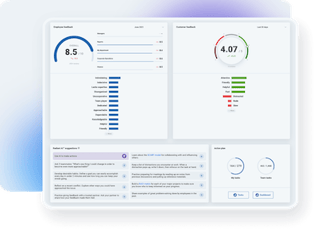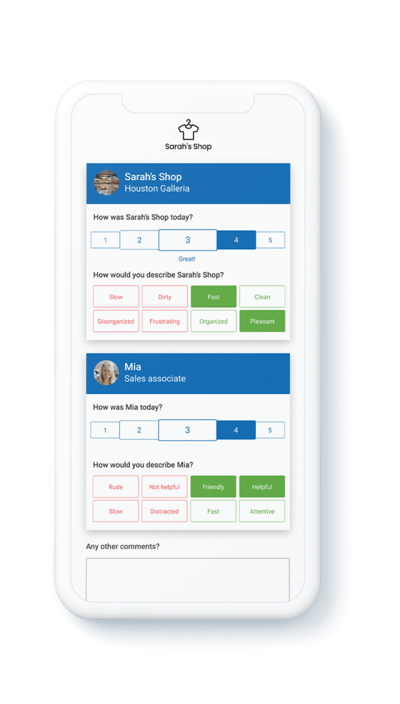
What Bad Customer Surveys Are Costing You
Surveys and feedback are critical tools for mapping out, evaluating, and improving customer experiences, which many businesses struggle to do: Acquia's 2020 Customer Experience Trends Report found “90% of customers believe when it comes to delivering a good customer experience, most brands fail to meet their expectations.” A good customer survey can empower you to create and execute data-driven strategies to excite and delight customers. A bad customer survey, on the other hand, can further the gap between you and your customers, damage your reputation, and drain your resources.
Types of bad customer surveys
Ineffective, unhelpful customer surveys commonly fall into one of two categories:
Generic
While research from New Epsilon indicates customers strongly prefer personalized experiences, generic surveys don't provide any personalization. They ask the same basic questions of every customer without accounting for the relevant details of each customer's experience.
One-dimensional
These oversimplified, one-dimensional surveys lump all aspects of a customer's experience together into one question, producing only one overall metric that can’t be broken down.
What bad customer surveys are costing you:
1. Customers
Surveys are a value-exchange between you and your customers. When customers take time out of their busy days to give you feedback, they expect their efforts to be met with improved experiences in the future.
The Northridge Group’s State of Customer Service Experience Report 2019 found 72% of surveyed consumers were willing to switch brands after just one bad experience. Retaining customers after a bad experience requires immediate, targeted improvements, but generic or one-dimensional surveys won’t capture the specific experience data you need to make near-term improvements. Their results won't indicate where the experience happened, what the customer needed, or which employees were involved, nor will they explain what went wrong. All you'll see from your survey results is that someone had a bad experience (and you’re likely to lose money.)
These surveys won't tell you what made a customer's experience bad, how widespread the issue is, or how it could be improved, leaving you unable to address your customer’s bad experience. The best chance they'll have for an improved experience will be with a different business.

2. Your reputation
When customers don't think you're listening, they tend to turn their attention to those who will: your other customers. If unhappy customers don't see you working to address their issues- especially if they’ve expressed their dissatisfaction in your customer survey- they might think the only way to inspire change is through a scathing online review or a furious rant to your other customers.
Generic or oversimplified surveys can’t capture the data needed to guide near-term meaningful improvements. Vague, high-level survey questions won't uncover the “why” behind the issues your customers experience, and the longer their issues go unaddressed while your employees scramble to interpret your survey results, the more your reputation will suffer.
3. Time
Bad surveys waste everyone's time. Your customers' time and effort will be wasted if your survey can't isolate what makes their experiences good or bad, and your employees will fall down rabbit hole after rabbit hole trying to extrapolate root causes from one-dimensional survey metrics.
And the time sink doesn’t stop there. Bad surveys can also trick you into wasting time on unnecessary efforts. They might give you just enough data to indicate something needs to improve, but they won’t show how to improve it. This leaves you to make a best guess and wasting resources on trial-and-error strategies that don’t address customer problems or improve their experiences.
4. Good employees
If your survey isn’t isolating customer issues and providing a clear path to address them, your customers will not be the only ones who grow unhappy. Customer-facing employees get tired of hearing the same complaints over and over again. When they continuously bear the brunt of customers' anger without seeing any meaningful changes, these employees become frustrated and disillusioned, which might help to explain why positions like customer service representatives see turnover rates as high as 45%, according to a study by QATC.
Good employees also crave feedback on how to improve. In one Udemy study, 80% of employees indicated that opportunities to learn and grow would help them feel more engaged at work. But generic and one-dimensional surveys don't capture feedback metrics at the employee level, so employees
5. Money
Configuring, implementing, and maintaining a customer survey program requires a sizeable capital investment to cover ongoing program and personnel costs. Simply put, if your customer surveys aren’t making money, they're costing you money.
Your customer surveys also divert resources away from other customer experience initiatives. The time your employees spend reviewing results from bad customer surveys is time they could be spending on other projects with a clearer path to increased revenue.
Good customer survey traits
Good customer surveys empower you to make data-driven decisions to improve customer experiences. If your customer survey doesn’t produce these kinds of actionable results, it's actively hurting your business by failing to retain customers, damaging your reputation, frustrating your employees, and wasting your time and money.
Good surveys, on the other hand, unlock new business, improve customer loyalty, and increase your bottom line. Good surveys do this by showing you exactly where and how you can improve your business by capturing specific, actionable data on every aspect of each customer’s experience, including:
Employees
Who often have the largest influence on customers' experiences. An attentive, knowledgeable employee can inspire loyalty in your customers, but a distracted, untrained employee can drive customers away.
Locations
Which indicate how the physical or virtual site’s characteristics impact the experience, e.g., how well the inventory is organized, how quickly customers were helped, how convenient the location is to access,
Services
Which indicate distinct services which can yield different experiences for customers, e.g. purchasing a car vs. getting routine car maintenance.
Products
Which indicate how individual hardware, software, or consumer products impact the experience, e.g., troubleshooting a smartphone vs. laptop, ordering a chicken sandwich vs. pasta for lunch.





